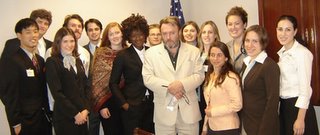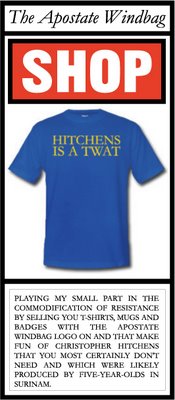Hitchens: Reactionary, sine macula

One supposes that if Hitch was willing to prostitute himself to wealthy hard-right Republican anglophile weirdoes for a tour of London along with fellow-former-leftist-turned-right-wing-wackjob David Horowitz (in which guests would have accompanied Hitch & Horowitz around the Houses of Parliament, the Tower of London [to see the bleeding crown jewels!] and other Olde Englande landmarks, had the event not been mysteriously cancelled), and is now regularly writing for Bill Kristol's neo-con and Christian right publication, the Weekly Standard, it really shouldn't surprise anyone that if anything remains of his leftist conscience, it certainly isn't needled by an appearance on conservative cougar Laura Ingraham's radio programme.

Laura Ingraham
However, for all his confidence in the anti-fascist, liberatory power of white phosphorus, cluster bombs, torture and anal rape with toilet plungers, one assumes that as a confirmed soixante-huitard, he could never descend so far as turning his back on anti-racism.
Such an assumption would be wrong. While even Marc Cooper and David Aaronovitch (and also, actually, an oddly remarkably lucid John Simpson) are quite clear about the racial and economic 'root causes' of the French émeutes des banlieues, Hitch remains more akin to the Mark Steyn/Daniel Pipes 'this is what you get if you let the darkies in' perspective: Via Lenny and Sonic at Hitch Watch, we find that Johnny Walker Black Label's best customer told Harpee Ingraham two days ago, 'If you think that the Intifada in France is about housing, go and try covering the story wearing a yarmulke.'
Although, frankly, it's not entirely dissimilar to what he said about the Bush administration's response to Hurricane Katrina having had nothing to do with race during the 'Grapple in the Big Apple' with Galloway in NY, to the shocked gasps of even those audience members who'd turned out to support him.
But wait - hold on to your fork, there's more. Sonic is also reporting that ultra-secularist Hitchens gave the Witherspoon Lecture this month at the Christian fundamentalist, pro-theocracy Family Research Council.
Here is a piccy of him looking beardy and surrounded by virgins:
And here is the image used to link to the Family Research Council's current campaign, which appears on the same page as Hitch's snapshot with the happy-clappy interns:

I wonder if his rider for the gig was the same case of scotch and 200-pack of Rothmans he gets at Hay-on-Wye?
And it doesn't stop there. I recently came across what's actually a fairly oldish article by Tawfiq Chawbourne, who managed to snag a quick and dirty thirty-second interview with the great man on the way out of some London to-do with Francis 'Marx would have approved of the invasion of Iraq' Wheen moderating and Ian McEwan in the audience.
Hitch actually offers Tawfiq an endorsement of the Bush policy on Venezuela, which regular readers will remember as having been a policy that encourages rightist coups. Chris then seems to even go so far as to approve of a Bay of Pigs redux. Says Christopher, 'Chavez is a thug. He’ll be gone within two years, as will the Iranian regime. And Bush will be landing in Havana within two years. Then the last two uniformed leaders [in the Americas] will be gone.'
However over-represented they are in the press, however few of them there may be, and however incoherent their arguments, pro-war leftists do in fact exist, but Hitchens is not one of them. An anti-Chavez, pro-invasion-of-Cuba, softly-racist, Sarkozy-sympathising, Weekly-Standard-publishing, Family-Research-Council-Witherspoon-lecture-giving, Laura-Ingraham-show-appearing individual cannot with any gleaning of truth left to the statement be called a leftist, regardless of his position on the war.
Nonetheless, I am at a loss as to an explanation how all this developed. Shock at 9/11 and any subsequent support for the war does not necessitate indifference to New Orleans or Clichy-sous-Bois suffering.
Lenny of the Tomb reckons 'the trauma of losing a good friend of his on 9/11…catalysed a turn to the right that he had been slowly making for years.' However, I'm not entirely convinced by the Paul Berman thesis that the 'muscular liberal' philosophy of Hitchens and other pro-war progressives, had been in gestation since the Balkan Wars or even as far back as the Rushdie-Le Carré brou-ha-ha. Although I was opposed to 1999's Nato bombing of Yugoslavia, I'll readily admit that the Balkan Wars were not easily ideologically navigable, and a good many who have been opposed to the war since the bombing of Afghanistan - such as the late Susan Sontag - were with Hitchens on the question of intervention in Bosnia and later Kosovo. Furthermore, while almost the entirety of the soft left in the US turned away while Clinton introduced his welfare reforms, expanded the death penalty, diminished health care funding (and in so doing restricted abortion access), enforced developing world structural adjustment and constructed the WTO, Hitchens pulled no punches. He was relentless in his assaults on Clintonian triangulation. If Hitchens' current positions are indeed part of a general trend dating back fifteen years, then there is a rather long, eight-year stretch of recalcitrant progressivism that is unaccounted for in the model.
I'd also not heard that Hitch had lost anyone, and am of the opinion that if he had, as he is more than shameless enough to exploit the person's memory, he would have mentioned it repeatedly. So I dragged out my copy of Love, Poverty & War from underneath the kitchen table's uneven leg, and re-read what Hitch had written immediately after 11 September.
Hitch's very first piece after 9/11, 'We're Still Standing', for the Evening Standard on 12 September, begins with, 'Well, I won't see Barbara Olson again.'
However, one doesn't get a sense from the article that she was his friend, merely that he knew her. Furthermore, in the days immediately after the towers fell, there was much talk of Olson's last minutes, as she had used her phone to alert her husband, the solicitor-general, of the hijacking. It may be more that Hitch was just mentioning that he happened to know a personnage that was in the headlines.
In any case, both this piece, and his second, on 13 September, for the Guardian, 'The Morning After', are actually of a radically different political perspective to everything he has written since, beginning with the now well-known 'Against Rationalisation,' on 20 September, for the Nation, where he would begin to stake out his liberal hawk position. Indeed, in the Guardian piece, Hitchens is quite critical of Bush, writing:
'The United States as a country has no fixed position on Islamic fundamentalism. It has used it as an ally, as well as discovered it as an enemy. It could not bomb Saudi Arabia or the United Arab Emirates, even if it found conclusive proof that the hijackers and assassins had actually trained there. So what does the president mean when he says so portentously that "we shall make no distinction between the terrorists and those who harbour them"? It looks like a distinction without a difference, and gives a momentary impression of being decisive, while actually only confusing the issue.'
And what is the issue of which he writes? Interestingly, it's the history of America's foreign policy:
'On the campus where I am writing this, there are a few students and professors willing to venture points about United States foreign policy. But they do so very guardedly, and it would sound like profane apologetics if transmitted live. So the analytical moment, if there is to be one, has been indefinitely postponed.' [Italics added]
Seven days later, he must have decided that the analytical moment was to be permanently postponed, and made a 180 degree turn away from this initial perspective with 'Against Rationalisation', and its follow-up, 'Of Sin, the Left, and Islamic Fascism', in which he attacked the left for saying essentially the same things he had said in his first two post-9/11 articles.
So, even if he had been close friends with Olson - which isn't clear in any case - he was still willing to 'rationalise' (his word) the attacks for at least another two articles after she had died. Thus the mystery is what made him change his mind within this seven-day period. If the shift had coincided with the attacks, his analysis would be fairly explicable, i.e., he was so shocked by the attacks that he reconsidered his perspective, etc., etc. - the similar arguments we heard from a number of liberal hawks - but it didn't.
The only point I've heard that attempts to explain this seven-day turnaround was that a close friend of his tore into him about the 'The Morning After' piece in the Guardian for much the same reason that he has since torn into Chomsky. However, I've only ever read this hypothesis once, and I can't remember where I read it or who this critic-friend was.
What I find curious is that none of his opponents has mentioned this. He's regularly asked by interviewers sympathetic and hostile why and when did he change his opinions, and he always responds that he didn't change, the Left did, and then produces this quaint story about being in a jeep during the first Gulf War with some Kurds who had a photo of George Bush Sr. attached to the vehicle which made him re-think his opinions, but this is an ex post facto reorganisation of his political trajectory accepted both by admirers and critics. The truth is that he changed quite abruptly some time between the 13th and 20th of September, 2001.
In the end, however, whatever it was that shifted him on the question of 11 September - as well as the battles this shift engendered between him and the left - have so comprehensively transformed his ideas that he is now, from belligerent, triple-chinned tip to lewdly blotto stern, not merely or even a liberal hawk, but a reactionary, sine macula.
































<< Home